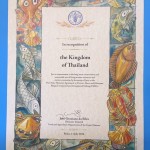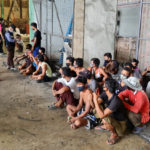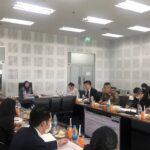
By Pornpimol Kanchanalak, special to The Nation on 18 March 2015
No one can deny it is a crime against humanity, one that has no part in any civilised world. Yet modern-day slavery comes in many shapes and forms and is thriving in every country via global supply chains. The US is no exception.
Everybody can also agree that already depleted marine life of our seas and oceans needs to be conserved from further plunder. Otherwise, the next generations may have to fight each other for dwindling food supplies, going to war over this most basic of resources.
However, an early bombardment mounted by the London-based NGO Environmental Justice Foundation (EJF) in an unprecedented alliance with the European Union's Marine Affairs and Fisheries department (DG MARE), has unfairly targeted Thailand. Its call for harsh punitive measures against the country is as curious a case as that of Benjamin Button – a fish issue that smells rather fishy.
Last month, the EJF released a brief called "Broken Promises: Why Thailand Should Stay on Tier 3 in the 2015 US Trafficking in Persons Report". Then it launched a series of activities dedicated exclusively to attacking Thailand. These activities included a seminar and report on collusion in the Thai public and private sector to permit slavery in the fishing industry. It also released a flick disguised as a serious documentary film, comprising mostly footage of fishing vessels and undated interviews of migrant workers on Thai boats. The film was recycled from an earlier undated film made by EJF. It ended with an image of packed shrimp, one of Thailand's major exports, which had allegedly been fed with meal from fish caught by unsavoury means. The message was clear: retributive measures against Thailand were warranted for a variety of reasons, ranging from human trafficking to depletion of the oceans.
Even more confounding was the fact that DG MARE, in an unprecedented move, jumped on EJF's bandwagon in condemning Thailand, citing reasons that were well beyond its own official mandate, which is to prevent illegal, unreported and unregulated fishing (IUU).
Somehow overlooked in this flurry of attacks is the fact that the current Thai government, in less than a year in office, has never been complacent about problems of human trafficking in the fishing industry and other business. In January, the National Legislative Assembly (NLA) passed a new fishery law that considerably strengthens official oversight, monitoring and surveillance systems, stipulates stringent guidelines for living conditions of workers, and requires mandatory vessel monitoring systems on thousands of fishing vessels. The prime minister himself chairs the anti-trafficking in persons commission. The Thai government also has begun to implement a traceability system throughout the fish production and supply chain. The government is also accelerating the registration of fishing vessels and intensifying random checks at ports and loading points to curb human trafficking.
It is unrealistic to expect a 360-degree turnaround of problems that were allowed to fester for decades through the inaction of previous Thai administrations. But no one should doubt the honest and earnest efforts by the current government to put things right. It is also collaborating with international and local organisations to combat human trafficking. The fact is that even in the United States we find the monsters of modern slavery, in the form of bonded labour in shipyards, where workers borrow cash that ties them to employers and to decrepit working and living conditions. The world's growing consumption of fish coupled with demand for higher profits in the increasingly "red ocean" fishery business make modern slavery a problem worldwide.
Poverty is the key condition that keeps this dreadful anachronism thriving.
Systemic corruption in the public sector is what sustains and perpetuates poverty as well as human trafficking. And that is why the Thai public fully endorses its government's effort in tackling the human injustice of corruption.
When it comes to the DG MARE's off-mandate action against Thailand, it is noteworthy that Thailand's volume of seafood exports to Europe is a direct threat to the commercial interest of one EU member, namely Spain.
Spanish fishing has been subsidised by its government to the tune of 5.8 billion euros since 2000, the International Consortium of Investigative Journalists reported in 2011. And despite most segments of the Spanish economy coming under black clouds of depression, fishing companies increased their income by 805 million euros in 2012, an increase of 3.8 per cent from 2009. The economic value of Spain's fishing industry stands at approximately 4.5 billion euros, with only about 1,000 jobs (11.3 per cent) lost due to the fall in production between 2011-2013, compared to the national 28 per cent unemployment rate. The hi-tech and huge Spanish fishing fleet of 10,116 vessels at an average tonnage of 38.1 boasts a harvesting and processing capacity that surpasses that of its British, French and Italian counterparts. Greenpeace called these vessels "Monster Boats", and the US has put Spain and Italy on the list of countries with IUU problems.
Meanwhile, Thailand is among the top 10 exporters of fish products to the EU. A Thai business concern has bought some EU seafood processing companies to complete the supply chain. The main fish product Thailand exports to Europe is processed tuna fish and it may not be a coincidence that the EU has been trying to include tuna on the list of sensitive products in the negotiations for a Thai-EU free trade agreement.
That the EU is poised this week to issue a "yellow card" against Thailand on the basis of IUU prompts the question of whether any or all of the latest rounds of coordinated attacks against Thailand are a non-tariff barrier measure that has less to do with the professed official and commendable principles of conserving the oceans, than protecting the commercial interest of some EU member countries.
Non-tariff barriers are no surprise, especially when the region's economy is tanking. It is an unfair trade practice that chips away at the credibility of the responsible organisation, ie the DG MARE. As for Thailand, our efficient tuna fish processing industries once again make us the victim of our own success, as was the case before with the United States a few years back. It is an injustice that jeopardises the world's trading system, just as modern slavery destroys human dignity, and overfishing decimates the healthy ecology of the oceans.
Source: http://www.nationmultimedia.com/opinion/The-curious-case-of-fish-politics-30256214.html




